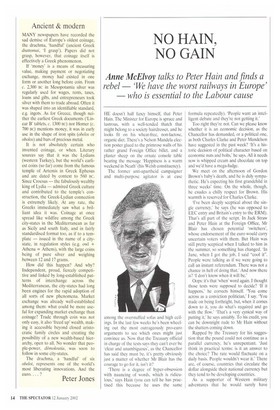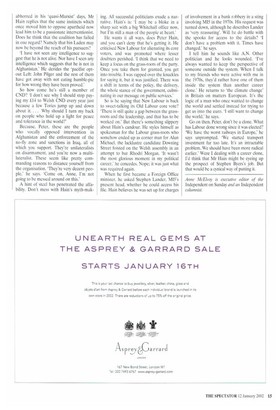NO HAIN, NO GAIN
Anne McElvoy talks to Peter Hain and finds a
rebel — 'We have the worst railways in Europe' — who is essential to the Labour cause
HE doesn't half fancy himself, that Peter Hain. The Minister for Europe is spruce and lustrous, with a well-tended thatch that might belong to a society hairdresser, and he looks fit on his wheat-free, non-lactose, organic diet. There's a Nelson Mandela election poster glued to the primrose walls of his rather grand Foreign Office billet, and a plaster sheep on the ornate console table bearing the message 'Happiness is a warm weekend in Neath' (his Welsh constituency).
The former anti-apartheid campaigner and multi-purpose agitator is at ease among the overstuffed sofas and high ceilings. In the last few weeks he's been wheeling out the most outrageously pro-euro arguments to see which ones might just convince us. Now that the Treasury official in charge of the tests says they can't ever be 'clear and unambiguous', as the Chancellor has said they must be, it's pretty obviously just a matter of whether Mr Blair has the courage to go for it, isn't it?
'There is a degree of hyper-obsession with nuancing of words, which is ridiculous,' says Hain (you can tell he has practised this because he uses the same formula repeatedly). 'People want an intelligent debate and they're not getting it.'
Too right they're not. Can we please know whether it is an economic decision, as the Chancellor has demanded, or a political one, as both Charles Clarke and Peter Mandelson have suggested in the past week? 'It's a historic decision of political character based on economic nuts and bolts,' he says. All it needs now is whipped cream and chocolate on top and we'd have a mega-fudge.
We meet on the afternoon of Gordon Brown's baby's death, and he is duly sympathetic. He's expecting his first grandchild in three weeks' time. On the whole, though, he exudes a chilly respect for Brown. His warmth is reserved for Charles Clarke.
'I've been deeply sceptical about the single currency,' he says (he was opposed to EEC entry and Britain's entry to the ERM). That's all part of the script. In Jack Straw and Peter HaM at the Foreign Office, Mr Blair has chosen potential 'svvitchers', whose endorsement of the euro would carry uncertain voters with them. But Hain was still pretty sceptical when I talked to him in the summer, so something has changed. 'In June, when I got the job, I said "cool it". People were talking as if we were going to call an instant referendum, There was not a chance in hell of doing that.' And now there is? 'I don't know when it will be.'
Cops: it's that 'when' word again. I thought those tests were supposed to decide? 'If it happens,' he corrects himself. 'You come across as a conviction politician,' I say. 'You trade on being forthright, but, when it comes down to it, you do what's required and go with the flow.' That's a very cynical way of putting it,' he says amiably. To his credit, you can be downright rude to Mr Hain without the shutters coming down.
Rapped by the Treasury for his suggestion that the pound could not continue as a parallel currency, he's unrepentant. 'Just think in practical terms: is it an answer to the choice? The rate would fluctuate on a daily basis. People wouldn't wear it.' There are, of course, countries that circulate the dollar alongside their national currency but they tend to be developing countries.
As a supporter of Western military adventures that he would surely have abhorred in his 'quasi-Marxist' days, Mr Hain replies that the same instincts which once moved him to oppose apartheid now lead him to be a passionate interventionist. Does he think that the coalition has failed in one regard? Namely that bin Laden may now be beyond the reach of his pursuers?
'I have not seen any intelligence to suggest that he is not alive. Nor have I seen any intelligence which suggests that he is not in Afghanistan.' He derides the 'pacifist optout Left: John Pilger and the rest of them have got away with not eating humble-pie for how wrong they have been proved.'
So how come he's still a member of CND? 'I don't see why I should stop paying my £14 to Welsh CND every year just because a few Tories jump up and down about it. . . . Why should I turn my back on people who hold up a light for peace and tolerance in the world?'
Because, Peter, these are the people who vocally opposed intervention in Afghanistan and the enforcement of the no-fly zone and sanctions in Iraq, all of which you support. They're unilateralists on disarmament, and you're now a multilateralist. These seem like pretty commanding reasons to distance yourself from the organisation. 'They're very decent people.' he says. 'Come on, Anne. I'm not going to be messed around on this.'
A hint of steel has penetrated the affability. Don't mess with Hain's myth-mak
ing. All successful politicians exude a narrative, Hain's is: 'I may be a bloke in a sharp suit with a big Whitehall office now, but I'm still a man of the people at heart.'
He wants it all ways, does Peter Hain, and you can't deny that he's getting it. He criticised New Labour for alienating its core voters, and was promoted where lesser doubters perished. 'I think that we need to keep a focus on the grass-roots of the party. Once you take them for granted, you get into trouble. I was rapped over the knuckles for saying it, but it was justified. There was a shift in terms of the policy, the delivery, the whole stance of the government, culminating in our message on public services.'
So is he saying that New Labour is back to sweet-talking its Old Labour core vote? 'There is still quite a gap between the grassroots and the leadership, and that has to be worked on.' But there's something slippery about Hain's candour. He styles himself as spokesman for the Labour grass-roots who somehow ended up as corner man for Alun Michael, the lacklustre candidate Downing Street foisted on the Welsh assembly in an attempt to bar Rhodri Morgan. 'It wasn't the most glorious moment in my political career,' he concedes. Nope; it was just what was required again.
When he first became a Foreign Office minister, he asked Stephen Lander, MI5's present head, whether he could access his file. Hain believes he was set up for charges of involvement in a bank robbery in a sting involving MI5 in the 1970s. His request was turned down, although he describes Lander as 'very reassuring'. Will he do battle with the spooks for access to the details? 'I don't have a problem with it. Times have changed,' he says.
I tell him he sounds like A.N. Other politician and he looks wounded. 'I've always wanted to keep the perspective of someone outside the system. When I talk to my friends who were active with me in the 1970s, they'd rather have one of them inside the system than another career clone.' He returns to 'the climate change' in Britain on matters European. It's the logic of a man who once wanted to change the world and settled instead for trying to get us into the euro, 'I still want to change the world,' he says.
Go on then, Peter, don't be a clone. What has Labour done wrong since it was elected? 'We have the worst railways in Europe,' he says unprompted. 'We started transport investment far too late. It's an intractable problem. We should have been more radical earlier.' Were I dealing with a career clone, I'd think that Mr HaM might be eyeing up the prospect of Stephen Byers's job. But that would be a cynical way of putting it.
Anne McElvoy is executive editor of the Independent on Sunday and an Independent columnist.



























































 Previous page
Previous page